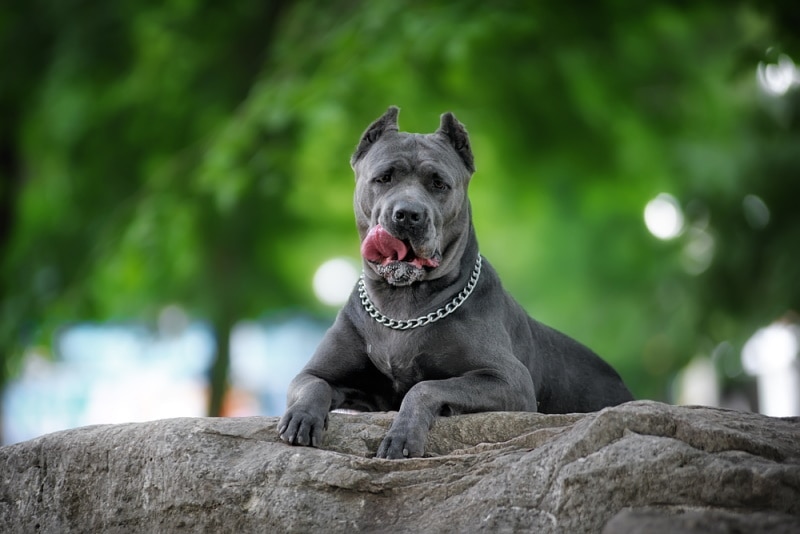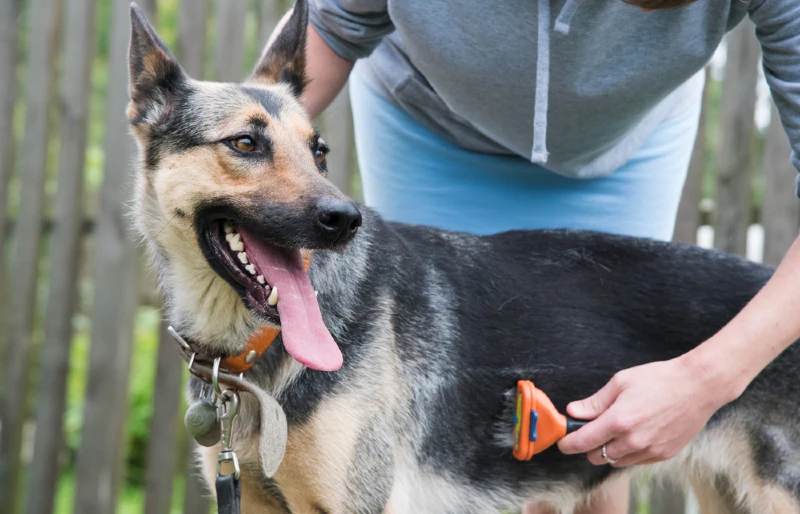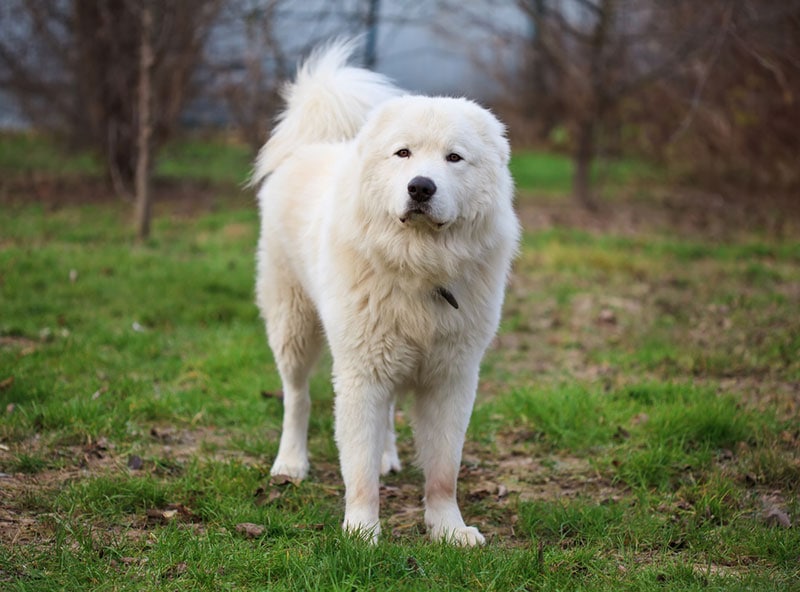Can Dogs Eat Cherry Tomatoes? Vet-Reviewed Facts & FAQ

Updated on
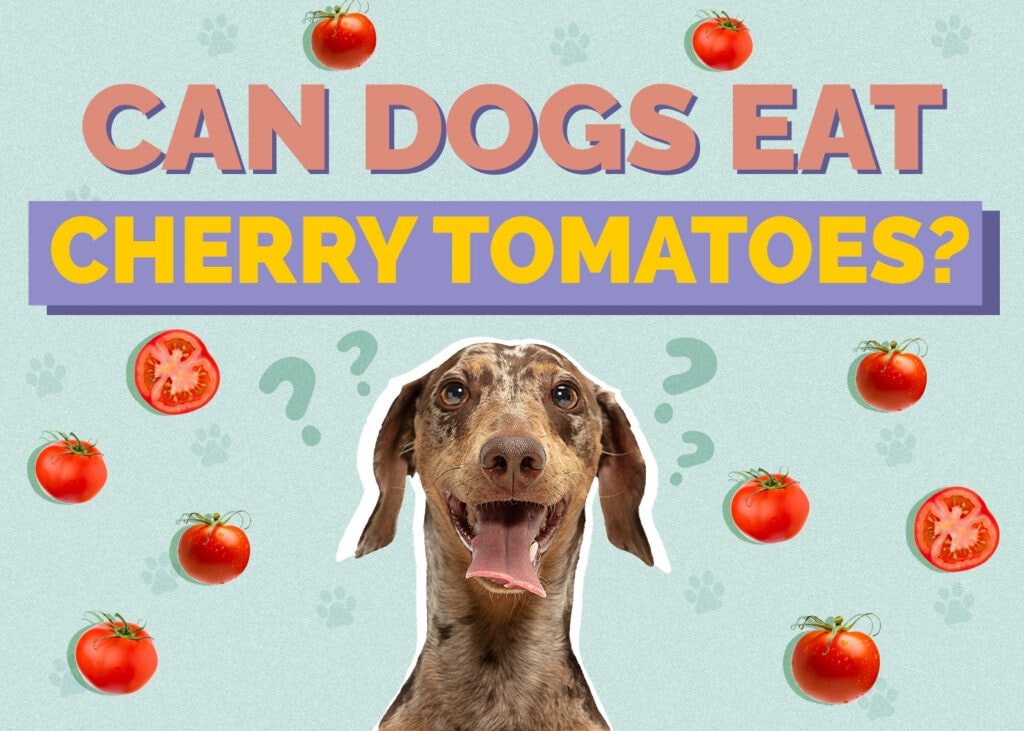
You may have noticed that your dog likes to eat your food. But is it safe for them to eat cherry tomatoes?
The short answer is yes, cherry tomatoes are safe and healthy for your dog. However, it would be best to feed them in moderation as an occasional treat.
Below, we cover everything you need to know about feeding cherry tomatoes to your dog. Read on to learn about the benefits as well as the dangers. We also tell you how to ensure your dog eats cherry tomatoes safely.
 Health Benefits of Cherry Tomatoes for Dogs
Health Benefits of Cherry Tomatoes for Dogs
Cherry tomatoes contain essential nutrients that promote health in humans. But are they beneficial to dogs?
Yes. Cherry tomatoes contain many nutrients that can improve your pup’s health. They include carotenoids, vitamins A and C, iron, potassium, and dietary fiber. Additionally, their high water content means they’re great at providing hydration for your pup.

Carotenoids
Cherry tomatoes have several carotenoids that can benefit your pup. Lycopene is the compound responsible for the red color in cherry tomatoes. The powerful antioxidant is concentrated in the skin and protects cells from damage caused by free radical molecules. By doing so, it promotes general health and well-being and may lower the risk of several chronic illnesses. Another carotenoid in cherry tomatoes, known as Lutein, is best known for its anti-inflammatory properties that protect eye function and facilitate brain health.
Iron
Iron is a mineral that plays a myriad of roles in your dog’s body, including carrying oxygen in the hemoglobin of red blood cells throughout their body.
Vitamin A
Vitamin A promotes healthy vision and alleviates sight-related issues such as night blindness and cataracts. It also boosts immunity and supports cell function and reproduction.
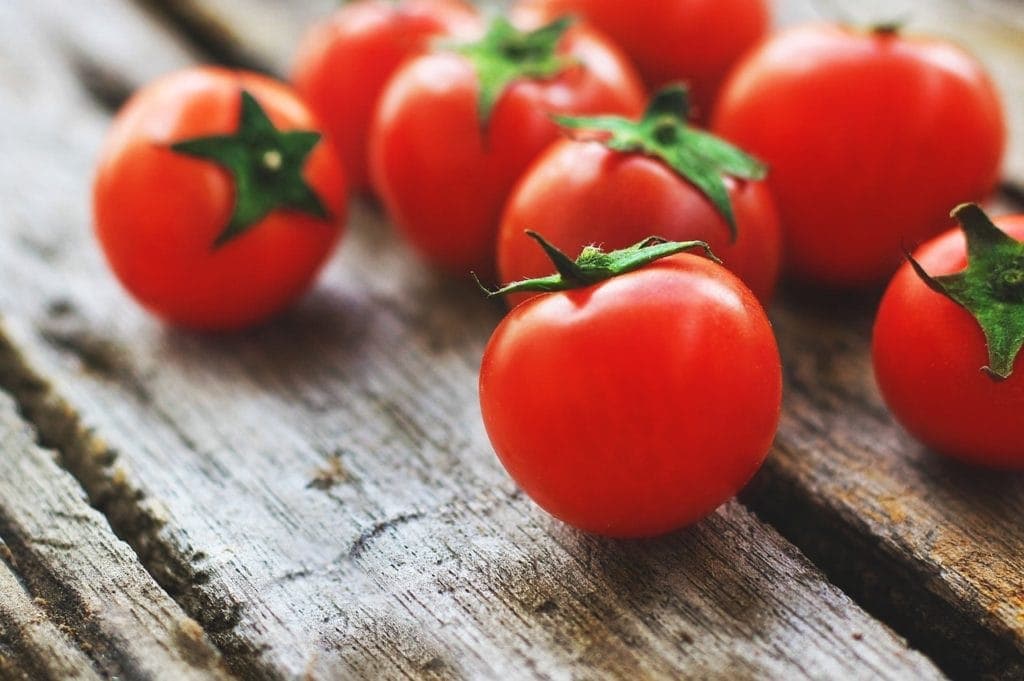
Vitamin C
Like lycopene, vitamin C acts as an antioxidant. It alleviates cell damage by searching out and eliminating free radical molecules. Moreover, it can boost your pup’s immune system and promote coat and skin health.
Potassium
Potassium regulates blood sugar and cholesterol levels. It also strengthens bones and promotes kidney and cardiovascular health.
Fiber
Tomatoes are high in fiber. Fiber assists digestion and helps keep your dog’s bowel movements regular. It may also help in weight management since it keeps animals fuller for longer after meals.

Dangers of Feeding Your Dog Cherry Tomatoes
Tomatoes belong to the nightshade family of plants. Therefore, they contain solanine, which is toxic to dogs and other pets. Additionally, tomato plants have another harmful toxin called tomatine.
Ingesting large amounts of these toxins can cause tomatine poisoning in dogs. These compounds are mostly found on the stem and leaves of the tomato plant, and are much higher in unripe tomatoes. With proper precautions on your part, the chances of such a poisoning are slim. For one, the toxins in ripe tomatoes are present in tiny amounts – as the tomato ripens, both solanine and tomatine reduce drastically. Making sure your pet doesn’t eat the green stem or leaves of cherry tomatoes will further reduce this risk considerably.
- Hypersalivation
- Loss of appetite
- Severe gastrointestinal upset
- Depression
- Muscle weakness
- Dilated pupils
- Slow heart rate
- Tremors
- Abdominal pain
- Seizures
Take your dog to your vet immediately if you notice the above symptoms. They will perform a thorough examination on your dog and ascertain the extent of the poisoning (if any) and administer appropriate treatments and at-home care instructions.
Although rare, just like us some dogs may have an allergic reaction to tomatoes. The signs of an allergic reaction may include hypersalivation, swelling of the mouth or face, coughing, wheezing, difficulty breathing, itchiness, and hives. For allergic dogs, these signs often present themselves shortly after they have consumed something they’re allergic to. Again, if you suspect an allergy, the best course of action is to have your dog immediately checked and treated by your vet – especially if you ever suspect your pup isn’t breathing normally. If an allergy is confirmed by your vet, you would have to avoid giving them cherry tomatoes in the future. Rest assured that many other dog-safe foods offer similar health benefits.
How to Feed Your Dog Cherry Tomatoes Safely
How can your dog acquire the health benefits of cherry tomatoes without putting its life at risk? Here are several tips on how you can feed it cherry tomatoes safely.

Only Feed Your Dog Ripe Tomatoes
The toxins in cherry tomatoes are only present in the ripe fruit in tiny amounts but more concentrated in green fruits, the stems, leaves, vines, and blossoms. Feeding your dog ripe cherry tomatoes is relatively safe, as the concentration of these compounds drastically lowers as the fruit ripens. Avoid unripe tomatoes, or cherry tomato variants of a color that make determining ripeness tricky.
Remove Any Green Parts
Remove any stems and leaves from the cherry tomatoes.
Wash the Tomatoes Thoroughly
Rinse the cherry tomatoes with water before feeding them to your dog. That’s because they could still have residues of herbicides and pesticides that can harm your furry friend.

Slice Them Into Small Pieces
Remove any unripe tomatoes from the group. Unripe tomatoes often have a different color when compared to a ripe tomato and are more firm to the touch. Slice the ripe cherry tomatoes into small pieces. Slicing the tomatoes minimizes the risk of them being a choking hazard, especially for small or toy breeds.
Cook Them Slightly
Slightly cooking the tomatoes will make it easier for the dog to digest. Additionally, the slight cooking will increase the lycopene content in the tomatoes, thus increasing the health benefits for your best friend.

Offer as Small Treats
Serve With No Seasonings
Serve the cherry tomatoes fresh with no seasonings, not even salt. Any additional seasonings may potentially be harmful for your dog.
Avoid Foods Containing Cherry Tomatoes
You might be tempted to feed your pup foods containing tomatoes. These may include store-bought juices, soups, and sauces.
Be cautious with this strategy, though. Although tomatoes are not harmful, tomato-based food may contain other ingredients that may cause a stomach upset. Additionally, such foods may also potentially contain ingredients that are toxic for dogs.
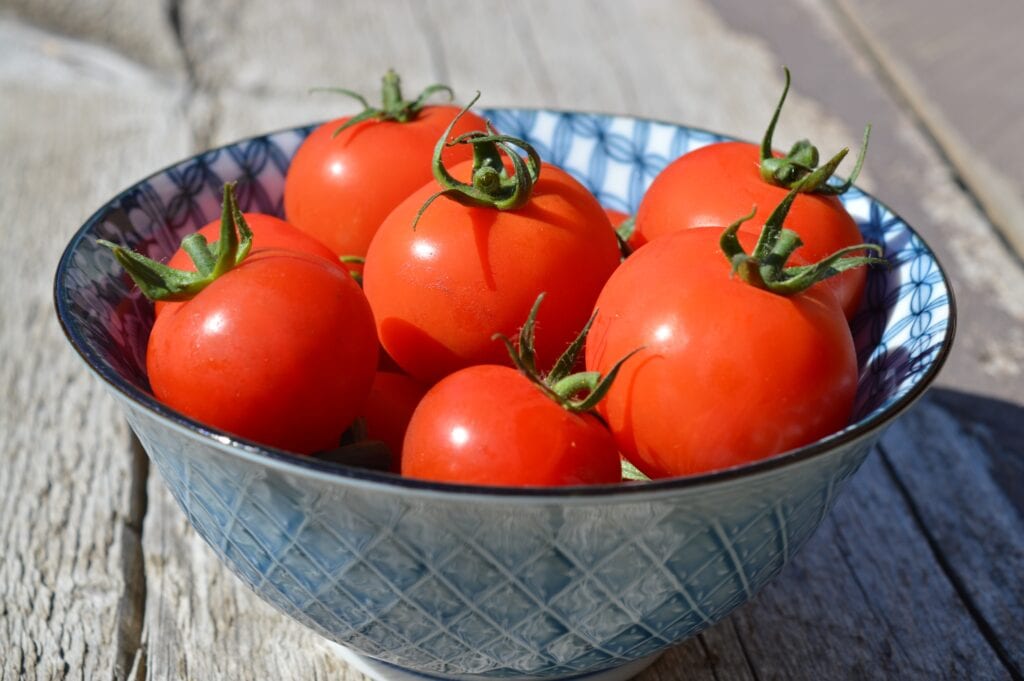
Avoid Canned Cherry Tomatoes
Canned foods are high in preservatives to give them a longer shelf life. The preservatives in such foods may potentially cause health problems, depending on what they are how much canned food your dog consumes. Therefore, it is best to refrain from offering your dog canned tomatoes. Your pup will be better off with fresh cherry tomatoes over canned tomatoes.
Consider Tomato Paste
Tomato paste can be a great alternative. It contains lycopene and beta-carotene, making it beneficial from a health point of view.
 How to Protect Your Dog From Tomatine Poisoning
How to Protect Your Dog From Tomatine Poisoning
If you grow your own food, safety measures need to be in place that prevent your dog from accessing growing plants. Potted plants should be moved to a location your dog can’t access. An appropriate location also ensures that your dog won’t accidentally knock over your plants.
Gardens should be protected with fencing and training your dog to stay away from specific areas, or restricting their access to where your growing plants are.
Also, keep an eye on your dog if you have cherry tomatoes or tomato-based food around the house. Otherwise, your dog may help themselves when your attention is elsewhere.
Proper house training is a great tool in preventing such mishaps and can minimize the risk of an unfortunate event.
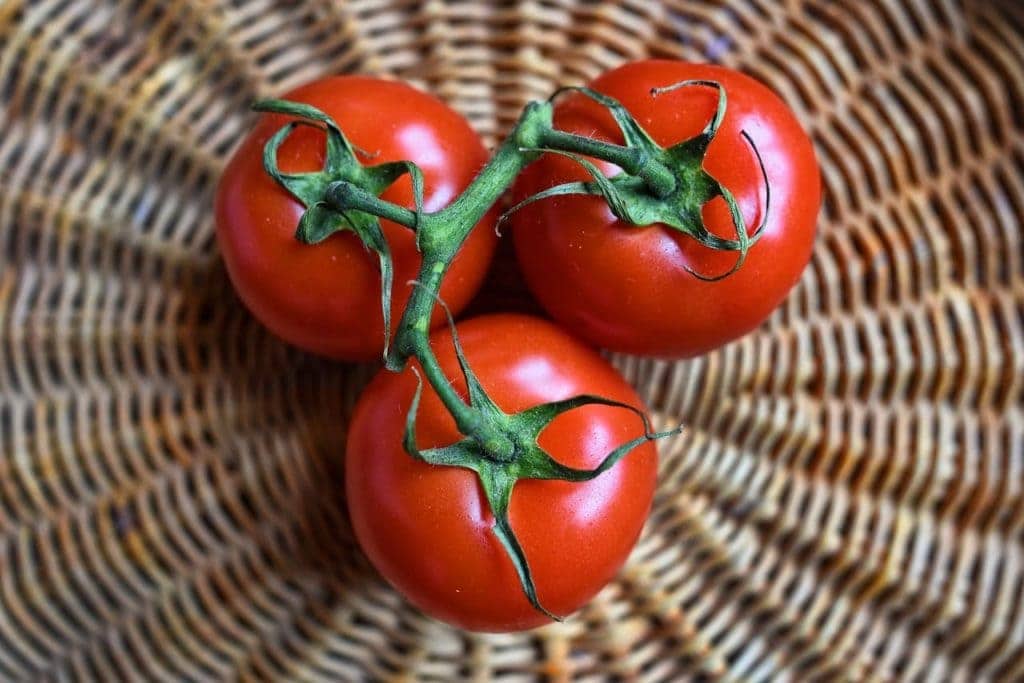
Foods Your Dog Should Never Eat
Cherry tomatoes might be safe. But not all human food is healthy for the dog. A curious dog may eat something they aren’t supposed to. Additionally, dogs are social eaters, and seeing a member of their “pack” (you!) eat might entice them to ask for a bite. For your dog’s safety, ensure the following foods are out of reach.
- Onions, Garlic, Chives, and Shallots
- Chocolate
- Salty food
- Alcoholic drinks and foods
- Macadamia nuts
- Grapes and Raisins
- Yeast dough
- Fatty foods
- Caffeinated food and drinks
- Milk and other dairy products
- Avocadoes
- Sugary foods and drinks
- Caffeine
 Final Thoughts
Final Thoughts
So, can dogs eat cherry tomatoes? Ripe cherry tomatoes, served without the stem or leaves, are safe for dogs when given in moderation as an occasional treat.
Unripe tomatoes, leaves, stems, sterns, and vines contain toxin compounds in high concentrations that can harm your dog and should be avoided.
When growing your own plants, ensure you have proper measures in place that prevent your dog from accessing them. These include a combination of where you may place the plants, barriers such as fences, and proper house training and monitoring of your pup.
Featured Image Credit: JumpStory

 Health Benefits of Cherry Tomatoes for Dogs
Health Benefits of Cherry Tomatoes for Dogs
 How to Protect Your Dog From Tomatine Poisoning
How to Protect Your Dog From Tomatine Poisoning